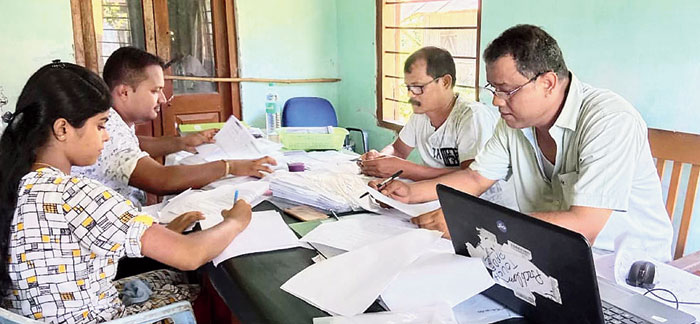The Supreme Court-monitored final National Register of Citizens is expected to be out in a few hours today and the citizenship future of 4 million Indians in Assam hangs in the balance.
After the list is out, those who do not find their names on it will face foreigners tribunals in Assam, the only authority that will review their claims and decide if they will live in detention or as citizens.
“The Lakshman Rekha of justice ends before the boundary of these tribunals,” Dhubri-based lawyer Masood Zaman said. His opinion of the tribunals is clearly unflattering. “It is easy to do narcotics cases, rape cases or other cases. Justice prevails there but not in the tribunals. That is the reason why I have stopped taking these cases,” Zaman said.
In the draft NRC list published in July 2018, more than 4 million people were left out from the list. The final list, according to the estimates of some, may result in the exclusion of around 2 million. All will be clear in a few hours.
The 4 million have already gone through a tortuous verification process with documentary proof and family tree verification to prove that they are Indians.
The names not on the NRC list today will have to go through an even stricter process where foreigners tribunals, now increased to 300 from 100, will decide their fate.
The tribunals, which will be of varying strengths in each place, are expected to follow a procedure. Here's how:
- A tribunal will send a notice to the excluded persons who will be given 120 days to appeal.
- Once a person gets a notice from the tribunal, s/he will have to appear before the tribunal on a fixed date. The tribunal will also fix another date for the person to submit a written statement that would record the objection against the allegation that the person is a foreigner.
- In the written statement, the person is expected to put down every shred of proof available on paper along with copies of documents that validate Indian nationality. All the documents, whether a 1966 voter list or a 1977 voter list, will have to be submitted with the written statement.
- After the written statement is submitted, the tribunal will seek a date for evidence. This evidence will be on an affidavit. The person challenging his/her non-inclusion in the NRC will be asked about the submission by the state’s advocate on the tribunal. For example, say in the 1966 voter list, a person's father’s name was Sanowar Ali, but in 1977, it became Haji Sanowar - Muslims who complete their Hajj often put Haji before their name. The advocate may say the two persons are different.
- The tribunal will set a date for cross-examination. The person challenging his foreigner status will have to appear before the tribunal court in person. The government’s advocate will question him/her on the claims submitted with the evidence affidavit. Witnesses, who are mentioned in the affidavit also have to appear at this stage for questioning to support the person's claim for citizenship. At this stage, married women not on the NRC list will face a problem as Indian women tend to change their names after marriage. Their address also changes. “To prove your marriage with a particular person, you might have to submit a shadinama or a nikahnama. To prove that this piece of document is correct, the woman will have to get the qazi or whoever officiated the marriage registration to court,” Zaman said.
- The person's lawyer will then argue to prove citizenship.
- The tribunal will declare its decision at a later date, not on the day of the arguments. A tribunal can also give an ex-parte judgment if a person fails to turn up at the hearing.

The Lakshman Rekha of justice ends before the boundary of these tribunals
Masood Zaman, lawyer in Dhubri
If declared a foreigner, the person will be sent to one of the detention centres in Assam. The next avenue for redress is the Gauhati High Court.
“It easily takes a month and a half or more to prepare the case and collect documents,' said a Barpeta-based lawyer who has been fighting such cases in tribunals for almost two years. 'Some tribunals ask for original documents at the start. Procuring these takes more time,” he said.
According to his estimate, a case can take anywhere between six months to a year to complete. Lawyers in Assam agree that the cases that used to languish in tribunals earlier are being wrapped up quickly now.
Part of the tribunals' quickness has to do with the Assam government’s influence over them. Tribunal members have been axed based on their “performance”. Performance could mean how many foreigners a tribunal member has declared. This control of the state over the quasi-judicial bodies has raised allegations of bias.
Vice News, which did an investigation report on NRC using RTI queries, had accessed judgments issued in the last six months of 2018 from five of Assam’s 100 foreigners tribunals. “In those tribunals, nearly nine out of 10 cases were against Muslims. Almost 90% of those Muslims were declared illegal immigrants — as compared with 40% of Hindus tried,” the report said.
The foreigners tribunal came into existence by a home ministry order on September 23, 1964. The appointed members, according to the order, were supposed to have “judicial experience”.
In May, after the case of a retired Kargil veteran Mohammed Sanaullah received media attention when he was declared a “foreign national”, several reports have emerged on the alleged bias of these tribunals. “There are too many Sanaullahs out there. There are cases where freedom fighters, BSF and army personnel or their descendants have been sent a notice by the tribunals,” Zaman said.











